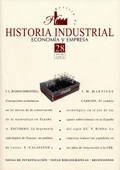Economic ideas in the beginning of Nature Conservationism in Spain: similarites and differences with the U.S. case
DOI:
https://doi.org/10.1344/rhi.v1i28.19569Keywords:
Conservationism, Environmental Protection, SpainAbstract
The origins of the Spanish conservationism are situated between the middle of nineteenth century and the Civil War. It has three bases: the aristocratic tradition of hunters and sportsmen, the naturalistic scientists and the hiking movement, and the Corp of Forest Engineers. The purpose of this work is, in the first place, to analyse if the early Spanish conservationism can be understood as a reaction against the environmental degradation linked to the industrialization and urbanization processes. In the second place, the economic conceptions that characterize the early Spanish conservationism, be examined because in it utilitarian motivations can be identified together with a pure ‘preservationism’associated with aesthetic, scientific or even spiritual values. Finally, in the third place, the aspects previously analysed for the Spanish case will be compared with the North American case, because there are very important links between the American Conservation Movement and the early Spanish conservationismDownloads
Downloads
Published
How to Cite
Issue
Section
License
El/la autor/a cede los derechos al/la editor/a. Creative Commons
El/la autor/a que publica en esta revista está de acuerdo con los términos siguientes:- El/la autor/a cede en exclusiva todos los derechos de propiedad intelectual al/la editor/a para todo el mundo y toda la duración de los derechos de propiedad intelectual vigentes aplicables.
- El/la editor/a difundirá los textos con la licencia de reconocimiento de Creative Commons que permite compartir la obra con terceros, siempre que éstos reconozcan su autoría, su publicación inicial en esta revista y las condiciones de la licencia.





